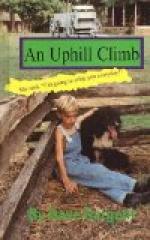Neither did he suspect that Jim’s stumbling and immediate spasm of regretful profanity at the bed-wagon where they unsaddled, was the result of two miles of deep cogitation, and calculated to account plausibly for not being able to produce a full flask upon demand. Jim swore volubly and said he had “busted the bottle” by falling against the wagon wheel; and Ford, for a wonder, believed and did not ask for proof. He muddled around camp for a few indecisive minutes, then rolled himself up like a giant cocoon in his blankets, and slept heavily through the night.
He awoke at daylight, found himself fully clothed and with a craving for whisky which he knew of old, and tried to remember just what had occurred the night before; when he could not recall anything very distinctly, he felt the first twinge of fear that he had known for years.
“Lordy me! I wonder what kinda fool I made of myself, anyway!” he thought distressfully. Later, when he discovered more money in his pockets than his salary would account for, and remembered playing poker, and having an argument of some sort with some one, his distress grew upon him. In reality he had not done anything disgraceful, according to the easy judgment of his fellows; but Ford did not know that, and he flayed himself unmercifully for a spineless, drunken idiot whom no man could respect or trust. It seemed to him that the men eyed him askance; though they were merely envious over his winnings and inclined to admire the manner in which he had shown his disapproval of the dealer’s attempt at cheating.
He dreaded Mason’s return, and yet he was anxious to see him and tell him, once for all, that he was not to be trusted. He held aloof from Jim and he was scantily civil to Dick Thomas, whose friendship rang false. He pushed the work ahead while the air was still alive with swirls of mote-like snowflakes, and himself bore the brunt of it just to dull that gnawing self-disgust which made his waking hours a mental torment.
Before, when disgust had seized upon him in Sunset, it had been an abstract rebellion against the futility of life as he was living it. This was different: This was a definite, concrete sense of failure to keep faith with himself and with Mason; the sickening consciousness of a swinish return to the wallow; a distrust of himself that was beyond any emotion he had ever felt in his life.
So, for a week of hard work and harder thinking. Mason sent word by a migratory cowboy, who had stopped all night at the ranch and whom he had hired and sent on to camp, that he would not return to the round-up, and that Ford was to go ahead as they had planned. That balked Ford’s determination to turn the work over to Mason and leave the country, and, after the first day of inner rebellion, he settled down insensibly to the task before him and let his own peculiar moral problem wait upon his leisure. He did not dream that the cowboy had witnessed his chastisement of the gambler and had gleefully, and in perfect innocence, recounted the incident at the Double Cross ranch, and that Mason had deliberately thrown Ford upon his own resources in obedience to his theory that nothing so braces a man as responsibility.




